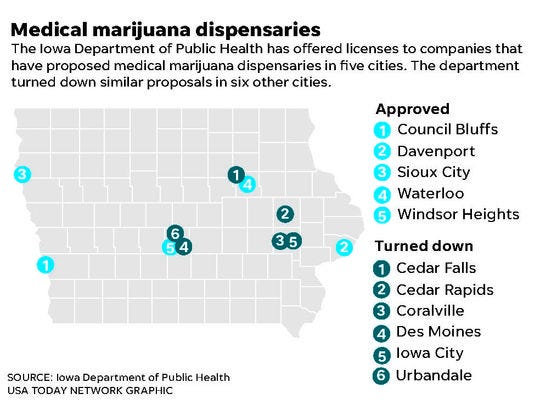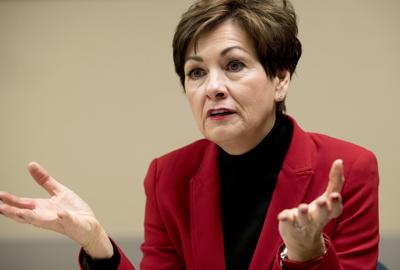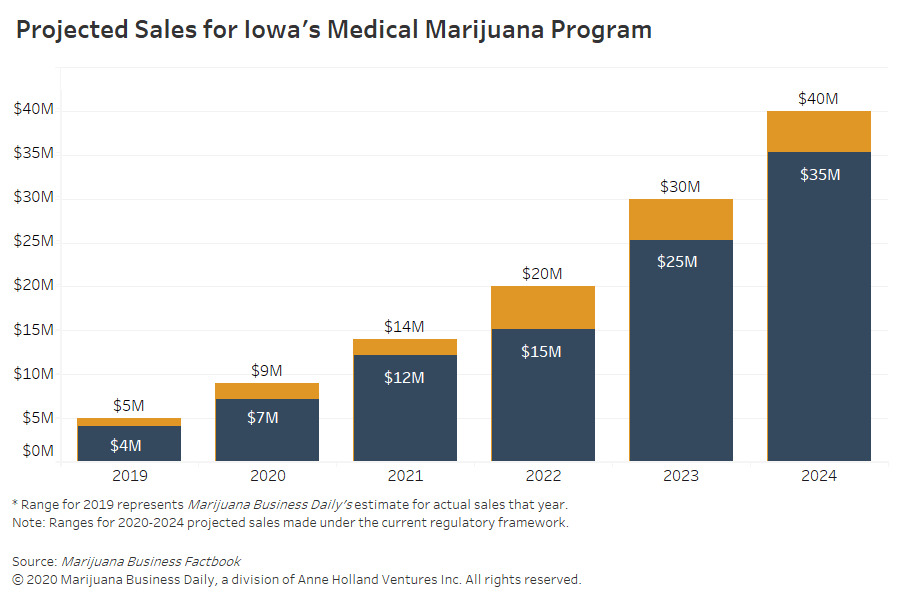Baron23
Well-Known Member
Iowa! Who knew? LOL But it looks like another FL type half effort....no MJ smoking. No taking plant material home to smoke. So, what does this bill authorize....dreaming about MMJ??
Legal medical marijuana passes Iowa Senate on 45-5 vote
A wide-ranging bill authorizing the use of medical marijuana for ailments from cancer to post-traumatic stress disorder was passed Monday night by the Iowa Senate, although it's unlikely to win approval in the Iowa House.
Senate File 506 was passed on a 45-5 vote. It would allow for patients with a range of medical conditions to obtain a medical cannabis registration card after receiving written approval from a doctor. The card would enable a patient to obtain medical marijuana from a dispensary in Iowa. It would legalize the production and distribution of medical marijuana in Iowa and would legally reclassify marijuana under state law.
Sen. Thomas Greene, R-Burlington, a pharmacist who was the bill's floor manager, urged support for the measure. He said many ailing Iowans now face the choice of obtaining marijuana illegally or moving to another state. An estimated 12,555 Iowans have medical conditions that could benefit from medical marijuana, he said.
"We want Iowans to know we care about them here," Greene remarked.
Sen. Joe Bolkcom, D-Iowa City, recounted heartbreaking stories of Iowans — some now dead — who have lobbied legislators in support of the bill. He was joined in support by Sen. Charles Schneider, R-West Des Moines, who said it would be ideal if the federal government legalized medical marijuana. But in the absence of federal action, 28 states have enacted patchwork of laws to address the issue, he added.
"In the end, I think this bill strikes the right balance," Schneider said.
Smoking medical marijuana would not be allowed, nor would people be allowed to buy plant material that can be taken home and smoked. But the legislation establishes a framework that should encourage investment by businesses, Schneider said.
No lawmakers spoke against legalizing medical marijuana during the Senate floor debate.
Medical conditions eligible for medical marijuana would include: cancer, multiple sclerosis, epilepsy, AIDS or HIV, hepatitis C, glaucoma, Crohn's disease or ulcerative colitis, amyotrophic lateral sclerosis, Ehlers-Danlos syndrome, post-traumatic stress disorder, Tourette’s syndrome, any terminal illness subject to certain conditions, intractable pain, Parkinson’s disease, muscular dystrophy, Huntington’s disease, Alzheimer’s disease, complex regional pain syndrome, rheumatoid arthritis, and any other chronic or debilitating disease or medical condition or its medical treatment approved by state officials.
But the Senate bill appears to face a major roadblock in House, where there aren't enough votes within the Republican caucus to pass the Senate bill, according to House Republican leaders.
House Speaker Linda Upmeyer, R-Clear Lake, said last week she is not necessarily opposed to allowing marijuana to be grown in Iowa and distributed as a medicinal product within the state’s borders. But she said she and others are trying to consider the economic viability of such a program as well as the implications under federal law. A bill is still alive in the House that would extend the sunset date of the current cannabis oil program and make available a cannabis-based product called Epidiolex once it’s approved by the Food and Drug Administration.
Rep. Jarad Klein, R-Keota, who has had a lead role in drafting medical marijuana legislation in the House, has agreed with Upmeyer that House Republicans favor a more limited approach than offered in the Senate bill. For example, he said he wants to avoid a loosely-regulated system where almost anyone could claim to have an illness in an effort to obtain medical marijuana.
Sen. Brad Zaun, R-Urbandale, issued a plea to House members during the debate to consider the Senate bill.
"A lot of people say, 'Why is this taking so long?' Well, the reason why is education. A lot of us have learned about the benefits of cannabis. I beg our House colleagues to do the right thing," Zaun said.
Iowans are now allowed to possess cannabis oil for the treatment of epilepsy. But it's illegal to manufacture or distribute that oil in the state, and federal law prohibits its transportation across state lines. In practice, that makes it illegal for Iowans to obtain the product. The state law allowing cannabis oil was enacted in 2014 but is scheduled to expire in July, leaving no state law in its place.
The five Senate members who voted against the bill Monday night included Democrat Tod Bowman of Maquoketa, and Republicans Dan Dawson of Council Bluffs, Mark Costello of Imogene, Julian Garrett of Indianola and Michael Breitbach of Strawberry Point.
Legal medical marijuana passes Iowa Senate on 45-5 vote
A wide-ranging bill authorizing the use of medical marijuana for ailments from cancer to post-traumatic stress disorder was passed Monday night by the Iowa Senate, although it's unlikely to win approval in the Iowa House.
Senate File 506 was passed on a 45-5 vote. It would allow for patients with a range of medical conditions to obtain a medical cannabis registration card after receiving written approval from a doctor. The card would enable a patient to obtain medical marijuana from a dispensary in Iowa. It would legalize the production and distribution of medical marijuana in Iowa and would legally reclassify marijuana under state law.
Sen. Thomas Greene, R-Burlington, a pharmacist who was the bill's floor manager, urged support for the measure. He said many ailing Iowans now face the choice of obtaining marijuana illegally or moving to another state. An estimated 12,555 Iowans have medical conditions that could benefit from medical marijuana, he said.
"We want Iowans to know we care about them here," Greene remarked.
Sen. Joe Bolkcom, D-Iowa City, recounted heartbreaking stories of Iowans — some now dead — who have lobbied legislators in support of the bill. He was joined in support by Sen. Charles Schneider, R-West Des Moines, who said it would be ideal if the federal government legalized medical marijuana. But in the absence of federal action, 28 states have enacted patchwork of laws to address the issue, he added.
"In the end, I think this bill strikes the right balance," Schneider said.
Smoking medical marijuana would not be allowed, nor would people be allowed to buy plant material that can be taken home and smoked. But the legislation establishes a framework that should encourage investment by businesses, Schneider said.
No lawmakers spoke against legalizing medical marijuana during the Senate floor debate.
Medical conditions eligible for medical marijuana would include: cancer, multiple sclerosis, epilepsy, AIDS or HIV, hepatitis C, glaucoma, Crohn's disease or ulcerative colitis, amyotrophic lateral sclerosis, Ehlers-Danlos syndrome, post-traumatic stress disorder, Tourette’s syndrome, any terminal illness subject to certain conditions, intractable pain, Parkinson’s disease, muscular dystrophy, Huntington’s disease, Alzheimer’s disease, complex regional pain syndrome, rheumatoid arthritis, and any other chronic or debilitating disease or medical condition or its medical treatment approved by state officials.
But the Senate bill appears to face a major roadblock in House, where there aren't enough votes within the Republican caucus to pass the Senate bill, according to House Republican leaders.
House Speaker Linda Upmeyer, R-Clear Lake, said last week she is not necessarily opposed to allowing marijuana to be grown in Iowa and distributed as a medicinal product within the state’s borders. But she said she and others are trying to consider the economic viability of such a program as well as the implications under federal law. A bill is still alive in the House that would extend the sunset date of the current cannabis oil program and make available a cannabis-based product called Epidiolex once it’s approved by the Food and Drug Administration.
Rep. Jarad Klein, R-Keota, who has had a lead role in drafting medical marijuana legislation in the House, has agreed with Upmeyer that House Republicans favor a more limited approach than offered in the Senate bill. For example, he said he wants to avoid a loosely-regulated system where almost anyone could claim to have an illness in an effort to obtain medical marijuana.
Sen. Brad Zaun, R-Urbandale, issued a plea to House members during the debate to consider the Senate bill.
"A lot of people say, 'Why is this taking so long?' Well, the reason why is education. A lot of us have learned about the benefits of cannabis. I beg our House colleagues to do the right thing," Zaun said.
Iowans are now allowed to possess cannabis oil for the treatment of epilepsy. But it's illegal to manufacture or distribute that oil in the state, and federal law prohibits its transportation across state lines. In practice, that makes it illegal for Iowans to obtain the product. The state law allowing cannabis oil was enacted in 2014 but is scheduled to expire in July, leaving no state law in its place.
The five Senate members who voted against the bill Monday night included Democrat Tod Bowman of Maquoketa, and Republicans Dan Dawson of Council Bluffs, Mark Costello of Imogene, Julian Garrett of Indianola and Michael Breitbach of Strawberry Point.





